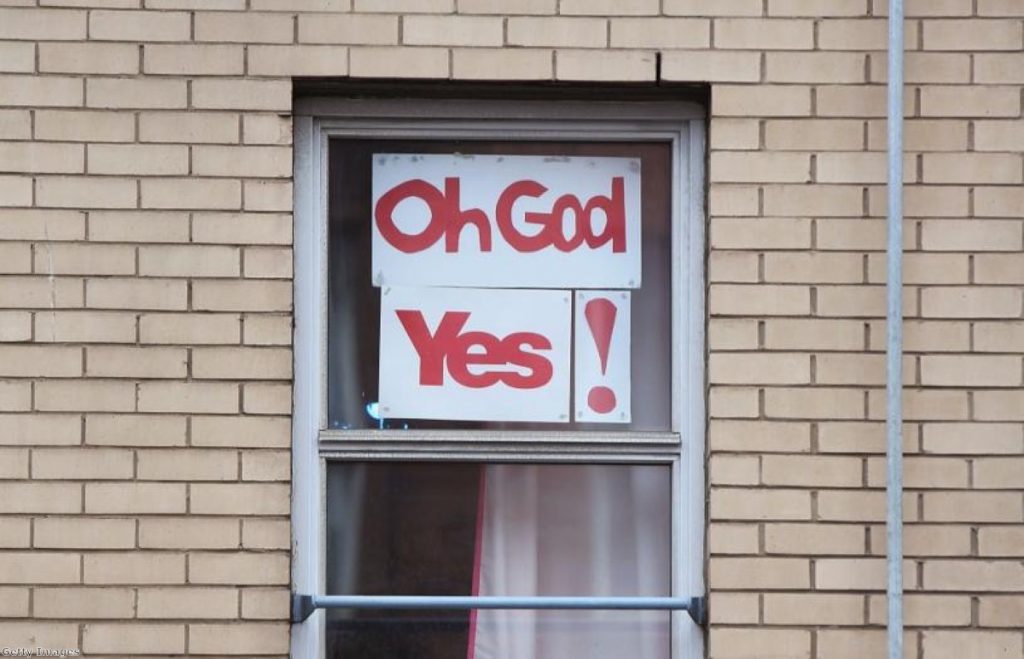Scottish independence referendum: Too close to call with just days left
Panic and dismay are spreading across the unionist camp, as polling confirms the race has become too close to call with just ten days to go before the Scottish independence referendum.
Yesterday's poll from YouGov/Sunday Times, which put 'yes' on 51% and 'no' on 49% when undecideds are discounted, is behind the alarm, which has left even the Queen voicing "a great deal of concern" that part of her nation may be about to leave it for good.
Other polls – including Panelbase figures putting 'no' ahead on 52% and 'yes' on 48% – confirm that the double-digit lead enjoyed by anti-independence campaigners for so long has evaporated.
And Rupert Murdoch has even claimed that the SNP's private polling has been giving the 'yes' vote support of up to 54%, leaving both sides facing a "desperate last ten days".


Confidence in the pound has been shaken, with the currency falling to its lowest level in ten months as a result of the news. Company shares have also been affected, with Royal Bank of Scotland down three per cent in early trading.
"It is clearly very tight," Better Together campaign leader Alistair Darling told the Today programme.
"We are in a position now where every voter in Scotland could potentially tip the balance in the referendum.
"But I am confident we will win because we do have a very strong, positive vision of what Scotland can be, both in terms of the opportunities and the security that come from being part of the UK, a strengthened Scottish parliament, with more powers which is what people want and you can do that without having to break up the country to do it."
Chancellor George Osborne, who has until now been relatively removed from the independence debate, emerged yesterday to promise a detailed timetable for handing Scotland more powers after a 'no' vote.
The promise for swifter devolution, which will be unveiled later this week, could see David Cameron, Ed Miliband and Nick Clegg share a political platform together for the first time ever.
The gambit has been dismissed by nationalist leader Alex Salmond as a "bribe" prompted by "panicky" decision-making by his political foes.
But Clegg said Salmond was being "wholly mischievous" to suggest that the Westminster establishment was attempting to win Scottish voters over at the last minute.
He said the details of the new "settlement" would be withheld until after the referendum, but that they would broadly offer "far greater powers for Scotland, but within the security and stability that the family of nations of the United Kingdom provides".
Clegg insisted: "It isn't about the Westminster parties seeking to pull a rabbit out of a hat at the last minute. It's a relatively straightforward incremental step that builds on work that's been going on for a long time."
Some prominent 'no' voters have voiced criticism of the way Darling has run his campaign.
Former Scottish first minister Henry McLeish told the Today programme: "The campaign so far has been narrow, it's been negative, it's also been patronising.
"It's really lacked emotion, lacked passion and lacked soul. So, therefore, in country like Scotland where the heart and head are to be taken together that has been a major deficiency."
Polling has suggested the nationalist campaign's positive message for independence is proving decisive. Salmond appears to be succeeding in his bid to persuade voters that independence poses only limited dangers to Scotland's economy.
The extraordinary shift in the campaign dynamic sets up a dramatic final ten days of campaigning.
"A two-point gap is too small for us to call the outcome," YouGov president Peter Kellner said.
"But the fact that the contest is too close to call is itself remarkable, as Better Together seemed to have victory in the bag."


